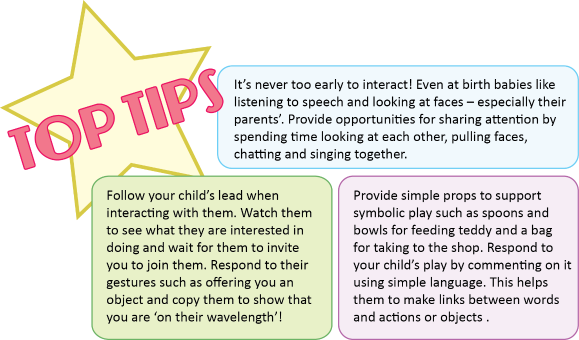Laying the foundations for speech - This is the first of two posts focusing on language development in babies and toddlers. This article briefly outlines the main precursors to speech. To find out more about how you can support you toddler as speech emerges please see my Top Tips for Talking.

Baby development: When do babies start talking?
Before speech can emerge babies need to develop a number of other important skills. First, they need to be able to share their attention with another person. In the early months of life this is achieved by mutual gaze (eye contact) and the exchange of vocal sounds, and then at around nine months baby and caregiver begin to focus jointly on objects in the environment. This ‘joint’ or ‘shared’ attention is important because it establishes a mental ‘link’ between the two parties and paves the way for interaction.
It is through play and interaction that babies then begin to understand that meaning can be copied and transferred from one situation to another. This is when – usually from around 12 months of age - symbolic play emerges. You may see your child doing things such as pretending to feed teddy some toast using a wooden block or ‘go to the shop’ in the next room. This developing understanding of symbolism is an essential precursor to verbal communication because it involves using words as symbols for events and objects and experiences.
Finally, by understanding that meaning can be shared through symbols children begin to make sense of the language we use with them. They begin to notice that a particular sound (word) is consistently paired with a certain object or event and so come to understand that there is a relationship between the two phenomena. Using what they already know about the object/event they can then assign meaning to the speech sound.
Here are my top tips for encouraging language development in children



